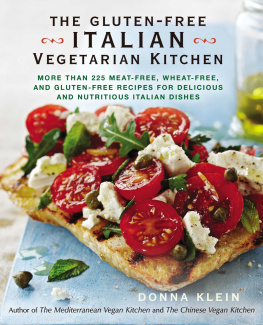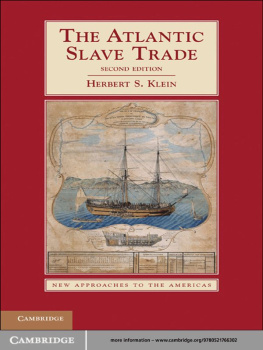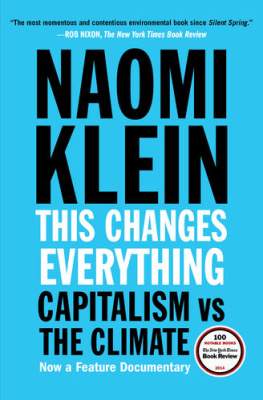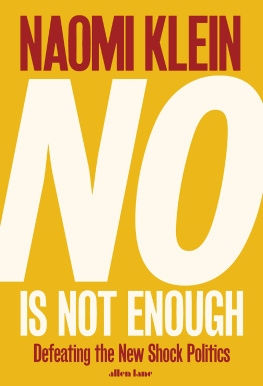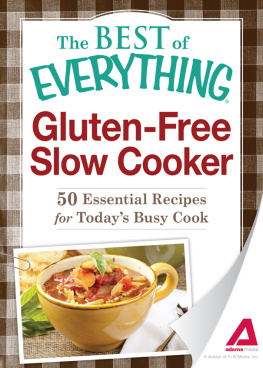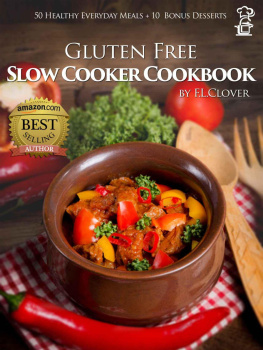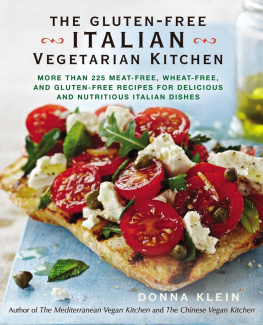Cookbooks by Donna Klein
The Mediterranean Vegan Kitchen
The PDQ (Pretty Darn Quick) Vegetarian Cookbook
Vegan Italiano
The Gluten-Free Vegetarian Kitchen
The Tropical Vegan Kitchen
Supermarket Vegan
The Chinese Vegan Kitchen
The Gluten-Free Italian Vegetarian Kitchen
A PERIGEE BOOK
Published by the Penguin Group
Penguin Group (USA) LLC
375 Hudson Street, New York, New York 10014

USA Canada UK Ireland Australia New Zealand India South Africa China
penguin.com
A Penguin Random House Company
Copyright 2014 by Donna Klein
Penguin supports copyright. Copyright fuels creativity, encourages diverse voices, promotes free speech, and creates a vibrant culture. Thank you for buying an authorized edition of this book and for complying with copyright laws by not reproducing, scanning, or distributing any part of it in any form without permission. You are supporting writers and allowing Penguin to continue to publish books for every reader.
PERIGEE is a registered trademark of Penguin Group (USA) LLC.
The P design is a trademark belonging to Penguin Group (USA) LLC.
Library of Congress Cataloging-in-Publication Data
Klein, Donna (Donna M.).
The gluten-free Italian vegetarian kitchen : more than 225 meat-free, wheat-free, and gluten-free recipes for delicious and nutritious italian dishes / Donna Klein.
p. cm.
ISBN 978-1-101-63464-6
1. Gluten-free dietRecipes. 2. Wheat-free dietRecipes. 3. Vegetarian cooking. 4. Cooking, Italian. 1. Title.
RM237.86.K642 2014 2014010299
641.5'638dc23
First edition: September 2014
The recipes contained in this book are to be followed exactly as written. The publisher is not responsible for your specific health or allergy needs that may require medical supervision. The publisher is not responsible for any adverse reactions to the recipes contained in this book.
While the author has made every effort to provide accurate telephone numbers, Internet addresses, and other contact information at the time of publication, neither the publisher nor the author assumes any responsibility for errors, or for changes that occur after publication. Further, the publisher does not have any control over and does not assume any responsibility for author or third-party websites or their content.
Most Perigee books are available at special quantity discounts for bulk purchases for sales promotions, premiums, fund-raising, or educational use. Special books, or book excerpts, can also be created to fit specific needs. For details, write: Special.Markets@us.penguingroup.com.
Version_1
To
Sts. Benedict and Anselm
and the Monastic Community of St. Anselms Abbey, Washington, DC,
for exhorting me to listen with the ear of my heart
ACKNOWLEDGMENTS
As always, many thanks to the following: my literary agent, Linda Konner; my publisher, John Duff, and the staff and crew at Perigee Books/Penguin Random House; my family, namely my daughters, Emma and Sarah; and my dogs, Trevor and Cooper. With their continuing support and presence in my life, writing my eighth cookbook was a pleasure.
Sincere thanks to the Rt. Rev. Dom James Wiseman, OSB, abbot of St. Anselms Abbey, Washington, DC, for warmly welcoming me as an oblate of St. Benedict on Epiphany Sunday, January 5, 2014.
Special thanks to the oblates of St. Anselms Abbey, a congenial group of predominately laypeople affiliated with the monastery, whose embodiment of Benedictine hospitality helped set the tone of this book.
Heartfelt thanks to Abbot Aidan Shea, our previous oblate director, and to Dom Boniface Von Nell, our current guide, for providing spiritual nourishment on the way home.
CONTENTS
PROVIDENCE IS PROLOGUE
When I put my seventh book to bed, I presumed it would be my last. After all, there are seven days in the week, the seventh being the day of rest; seven deadly sins, the seventh sometimes listed as the sin of gluttony (These are all cookbooks, mind you, with a combined total of more than 1,600 recipes!); and seven sacraments, the seventh known in my childhood as the Last Ritesall signs forecasting retirement at the very least. But before the ink on The Chinese Vegan Kitchen was barely dry, Providence began hinting not so fast... On the first Sunday of November 2012, I was received as a novice oblate of St. Anselms Abbey in Washington, DC. Before my blessing, I was handed a copy of The Rule of St. Benedict and noted with delight our shared publisher, Penguin. An individual familiar with the acknowledgment of St. Francis in one of my previous books, Vegan Italiano, blithely suggested that, for the sake of Benedictine balance, I write a new cookbook and dedicate it to my other favorite Italian saint. I replied that I had no chancemy publisher would never consider another Italian cookbook written by the same author, especially an author who is not even Italian. Besides, one was enough. Three days later, I opened an email from my publisher asking if I would be interested in writing an Italian cookbook for my gluten-free readers who were missing their pasta and pizza. On November 1, 2013, the Feast of All Saints, I submitted the manuscript for The Gluten-Free Italian Vegetarian Kitchen, dedicated to Sts. Benedict and Anselm and the Monastic Community of St. Anselms Abbey. With number eighta numeral associated with resurrection and renewalofficially published, I am pleased to proclaim with a bow to Providence that number seven was, blessedly, not my last.
I would like to think that St. Benedict approves of this cookbook. Though not explicitly vegetarian, The Rule is intrinsically peaceful and forbids monks (other than the sick) to eat the meat of four-footed animals and, in some stricter traditions, fowl and fish. Though uniformity in diet is desirable, St. Benedict allows for individual weaknesses by providing his monks with two kinds of cooked food from which to choose, and adding a third dish of fruit and fresh vegetables when available. In further demonstration of The Rules flexibility, particularly where nourishment of the body is concerned, St. Benedict essentially gives the abbot the authority, when deemed necessary, to change the diet. Back in the day of St. Benedict, the menu was hardly gluten-freefar from it. According to The Rule, a generous pound of bread was assigned to each monk to accompany his meals throughout the day. Though celiac disease was first described in the second century, before St. Benedicts time, it wasnt until the late nineteenth century that dietary changes were used as a medical treatment. In any case, had St. Benedict been cognizant of the disease and its treatment, I can easily envision the saint rising before dawn to bake a gluten-free loaf in a designated gluten-free oven to provide an afflicted brother with his dose of daily bread.
The same loving-kindness St. Benedict displays toward his fellow monks is extended to those outside the monastery in the form of hospitality, a pillar of

